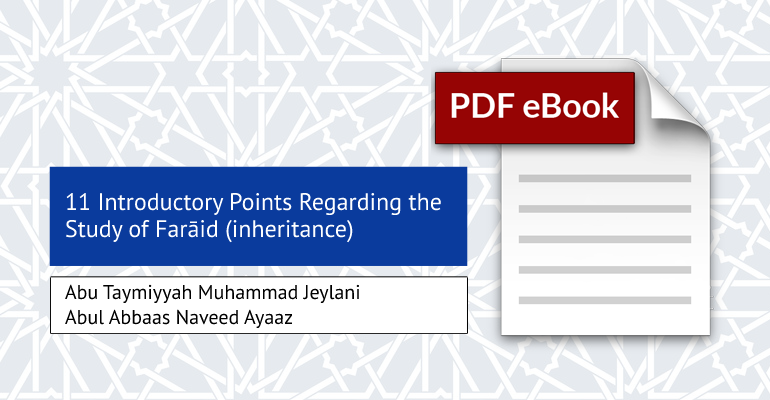 Loading...
Loading...
In the name of Allāh, the Most Merciful, the Bestower of Mercy.
There are ten key introductions which give the student an insight to any branch of knowledge. These ten key introductions have been summarized in the following lines of poetry.
إنَّ مَبَادِئَ كُلِّ عِلْمٍ عَشَرَة الـحَدُّ والـمَوضُوعُ ثُـمَّ الثَّمَرَة
وفَضْلُهُ ونِسْبَةٌ والوَاضِعْ والإِسْمُ الإسْتِمْدَادُ حُكْمُ الشَّارِعْ
مَسَائِلُ والبَعْضُ بِالبَعْضِ اكْتَفَى ومَنْ دَرَى الـجَمِيعَ حَازَ الشَّرَفَا
The ten key introductions are:
- Al-Ḥadd: The technical definition of the branch of knowledge being studied. If it is one of the Islamic sciences, the Shar’ī definition is stated. Any definition must be concise, precise and comprehensive.
- Al-Mawdū’: The subject matter which is being studied within the branch of knowledge. For example, the subject matter of the study of medicine is: human physiology, diseases and cures.
- Ath-Thamarah: The benefits and fruits of studying the particular branch of knowledge.
- Al-Fadl: The virtue and merits of this branch of knowledge, over the other sciences.
- An-Nisbah: The relationship between this particular branch of knowledge to the other various sciences.
- Al-Wādi’: The founder(s) of the branch of knowledge as an independent science. Often, there is no one founder however there are personalities who have influenced its evolution through authorship, tutorship and the defining of principles.
- Al-Ism: Its name(s) by which it is known, and differentiated from other sciences.
- Al-Istimdād: The roots of this branch of knowledge, and its dependency on the other sciences.
- Al-Ḥukm: The ruling of the Sharῑ’ah with regards to its teaching and studying. This ranges from it being Mubāḥ (permitted) which is often the case with secular sciences, to Wājib (obligatory) such as the study of Tawḥīd and aspects of Fiqh.
- Al-Masāil: The individual issues studied within Farāid.
In order to enable a more complete insight into the science, an 11th introductory point has been added which is “al-Maṣādir” ie relevant resources and major works which can be used as a reference point for students of knowledge.
This article will provide an insight to the knowledge of Farāid by applying the above 11 introductory points to this science.
- Its definition
The technical definition of the knowledge of Farāid is:
عِلمٌ يُعرَفُ بِهِ مَن يَرِثُ ومَن لا يَرِثُ ومِقدارُ ما لِكُلِّ وارثٍ
A branch of knowledge which enables a person to determine who inherits [the wealth of the deceased], and who does not inherit, and the amount of inheritance entitled to each heir.[1]
- Subject matter.
The wealth and property of the deceased, and the rights of the heir(s), to ensure that the right amount is distributed to those who are entitled.
- Its benefits
Through the study of Farāid, a person is able to distribute the wealth of the deceased according to the laws of the Sharī’ah. This is in addition to the attainment of reward for studying and teaching Islamic knowledge.
- Its virtue and merit
Through the study, teaching and implementation of Farāid, the Sharī’ah is preserved and its laws are applied, thus ensuring justice and the removal of oppression. From the particular virtues of this science, is that reconciliation often occurs between disputing parties within families, thus the ties of kinship are preserved.
The Prophet ﷺ said,
Ensure the inheritance reaches its [deserving recipients]… [2]
“Learn the laws of inheritance and teach it, for it is half of knowledge, but it will be forgotten. This is the first thing that will be taken away from my nation.”[3]
- Its relation to other sciences.
Farāid is a branch of Fiqh; however accepting the appropriateness and fairness of the laws of Farāid is an aspect of ‘Aqīdah.
- Founder(s).
Since Farāid is a branch of Fiqh, with its evidences in the Qur’ān and Sunnah, it has no “founder” except Allāh, and then His Messenger ﷺ as the one who conveyed its rulings. However there are various people who played a major role in its evolution as a science such as the Companions of the Prophet ﷺ, especially the Rightly Guided Caliphs.
- Name(s) of the science.
This branch of knowledge is known through various names, including
- “Al-Farāid”
- “Al-Mawārīth”
- “Fiqh at-Tarikāt”.
All the above names portray the same meaning i.e. the laws of inheritance.
- Its roots.
The roots of Farāid stem from Fiqh, and Fiqh is rooted in the evidences of the Qur’ān and Sunnah. The laws of Farāid were also influenced by the Ijtihād [judgements and rulings] of the Ṣaḥābah, especially the Rightly Guided Caliphs.
A person requires the knowledge of Tafsīr to understand the Āyāt relating to inheritance; some understanding of the Arabic language, and there is an assumption of a person’s abilities to carry out simple math’s equations such as fractions.
- Its Islamic ruling.
Its ruling differs depending upon the role of the person:
- It is Fard ‘Ayn i.e. an individual obligation in terms of implementing the laws of Farāid. Every Muslim is obligated to accept the distribution of inheritance, and implement it according to Islām.
- Its learning is Fard Kifāyah i.e. a communal obligation upon the students of knowledge and scholars, to ensure the laws are applied correctly by the Muslim Ummah.
- Its issues.
The issues which the science of Farāid revolves around are: knowing the people who are entitled to inheritance, and those who are not, knowing the amount each is entitled to, and the conditions of inheritance.
- Beneficial references.
The science of Farāid is based upon three Āyāt in the Qur’ān, all in Ṣūrah an-Nisā. They are Āyāt no. 011, 012 and the last Āyah 176.
As for the Aḥādīth which explain the above Āyāt, and the judgements and rulings of the Ṣaḥābah, they are found in the various compilations of Ḥadīth.
There are other works which have become a reference point for this science, three particularly beneficial ones are:
- “Ar-Raḥbiyyah fī ‘ilm al-Farāid”; a poem composed by Imām Muwaffaq ad-Dīn Muḥammad ar-Raḥbi.
- “Talkhīs al-Farāid” by Imām Ibn ‘Uthaymīn.
- “At-Taḥqīqāt al-Mardiyyah feee al-Mabāḥith al-Fardiyyah” by Shaykh Ṣāliḥ al-Fawzān.
Allāh knows best, may peace and salutations be upon the Prophet, his family and companions.
Footnotes
[1] At-Taḥqīqāt al-Mardiyyah fī al-Mabāḥith al-Fardiyyah by Ṣālihhh al-Fawzān.
[2] Narrated by Ibn ‘Abbās; Collected by al-Bukhārī & Muslim.
[3] Narrated by Abu Hurayrah; Collected by Ibn Mājah, at-Tirmidhī, al-Ḥākim, al-Bayhaqī and others; Graded Da’īf by Albāni in Irwā al-Ghalīl.





